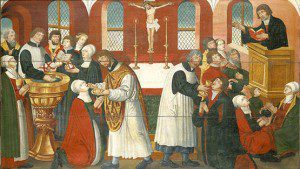 While the Catholic Church is deeply divided over what I call the Pope’s liberal Protestantism, and more and more evangelicals are embracing a progressivism that resembles yesterday’s social gospel, two Anglicans are proposing an Anglican way toward orthodoxy. Cranmer scholar Ashley Null and pastor-theologian John Yates III propose “A Manifesto for Reformation Anglicanism” in the last chapter of Reformation Anglicanism: A Vision for Today’s Global Communion.
While the Catholic Church is deeply divided over what I call the Pope’s liberal Protestantism, and more and more evangelicals are embracing a progressivism that resembles yesterday’s social gospel, two Anglicans are proposing an Anglican way toward orthodoxy. Cranmer scholar Ashley Null and pastor-theologian John Yates III propose “A Manifesto for Reformation Anglicanism” in the last chapter of Reformation Anglicanism: A Vision for Today’s Global Communion.
Null and Yates proclaim seven theses in their manifesto.
- Reformation Anglicanism is apostolic. That is, it is devoted to the primacy of the apostolic witness in the New Testament, as opposed to liberal Protestantism and the social gospel finding their authority in the social sciences since the 1960s.
- Reformation Anglicanism is Catholic. They remind readers that the Protestant reformers were still Catholics who sought to reform their Church. That was true until Rome excommunicated Luther and until Calvin started, very early on, to meet with others who felt Rome had betrayed the gospel. But this book’s point is that the English reformers who started Anglicanism were devoted to the creeds and the first four general Councils while the worldwide Church was undivided.
- Reformation Anglicanism is “well, Reformational.” In other words, in contrast to the semi-Pelagianism of the late medieval period, the Anglican reformers emphasized less what we do and far more what God has done for us in Christ. In a word, love.
- Reformation Anglicanism is mission-focused. Cranmer tried to influence Europe by promoting a continental summit of Reformation theologians. The Anglican churches sent missionaries to Africa in the nineteenth century, a mission whose long-term result was an African revival that continues to this day and sends African missionaries to now-pagan England and confused America!
- Reformation Anglicanism is episcopal. Anglicanism teaches that having bishops—such as Paul was to the churches he planted—is the bene esse of the church, that is, essential to its well-being. Null and Yates remind us that the bishop’s primary task, as it was for Paul, was to teach and protect orthodoxy.
- Reformation Anglicanism is liturgical. I would add sacramental. Null and Yates point to Cranmer’s development of Morning and Evening Prayer liturgies that combine beautiful prayers from the early church with a Bible-reading schedule that takes participants through most of the Bible every year. It also features sacraments which show and bear Christ in ways that touch all five senses.
- Reformation Anglicanism is transformative. Works-based religion promotes fear and anxiety, while the gospel of God’s love communicated through liturgy and sacraments remakes men and women from the inside out.

In a word, the authors say at the end of their book, Reformation Anglicanism is relevant. Progressive versions of Christianity that strain to keep up to date with the latest fads are actually irrelevant to our deepest needs. Only the ancient testimony to the Trinitarian God who comes to us in the creeds and liturgies and sacraments of the historic church can meet us where we most deeply need God.











